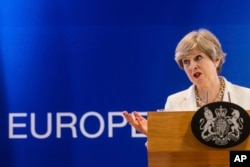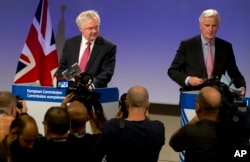EU officials hope the British government shows more sense of urgency about a Brexit deal when its negotiators come to Brussels on Monday for a first full round of talks aimed at smoothing Britain's departure.
"The hard work starts now," the European Union's chief negotiator Michel Barnier said Wednesday, again sounding a note of alarm that London has yet to provide detailed proposals on a range of key issues, with barely a year left for bargaining.
A year after the referendum vote to leave the bloc propelled her to power, Prime Minister Theresa May still faces a complex task in finding consensus at home on what kind of Brexit Britain wants — a job made all the harder by losing her parliamentary majority in an election last month.
Her Brexit minister, veteran anti-EU campaigner David Davis, is expected to meet Barnier, a French former cabinet minister, at the European Commission's Berlaymont headquarters on Monday morning.
They and their teams will then spend up to four days in a mixture of smaller working groups and plenary sessions, with the priority being to identify areas of accord and discord on a set of issues agreed on during an initial day of talks on June 19.
These issues, notably the rights of expatriate citizens, how much Britain may owe to the EU budget and how to manage the new EU-UK border, especially with Ireland, are ones both sides want to settle in a withdrawal treaty. Barnier says this must be ready by about October next year if it is to be ratified on both sides of the Channel before Britain leaves in March 2019.
"The clock is ticking," he said Wednesday, displaying a degree of impatience with British ministers who continue to dismiss EU demands that they first must agree in principle that London will owe the Union a hefty amount — probably in the tens of billions of euros — to cover its existing commitments.
"The first serious test of the negotiations will be them agreeing to pay the bill," a senior EU official said, describing the coming week as a vital moment to establish rapport among the senior civil servants who will handle what is arguably the most convoluted and far-reaching diplomatic deal of modern times.
Progress required
Without "significant progress" on all three priority areas of the divorce package, Barnier warns, EU leaders will not let Davis open talks on a free trade relationship, which May and much of British business want to have ready by the time Britain leaves.
For now, the EU says May's offer to guarantee the rights of 3 million Europeans in Britain falls short. It is also unhappy at Britain's refusal to accept EU judges as the ultimate arbiters of disputes — an issue that could get an early airing as London seeks a quick fix to prevent its withdrawal from the Euratom pact disrupting its nuclear industry and medical imaging.
Committed to keep all 27 other EU governments informed and on board with a process in which all have differing interests, the Commission negotiators are insisting on publishing negotiating documents and holding regular news conferences — a cause of some discomfort in London.
EU officials expect Barnier and Davis to brief reporters again Thursday, partly to nail down the week's achievements.
"It's important to describe our progress," the senior EU official said, likening the Brexit process to trade negotiations that the Commission more typically runs with other governments.
"If you don't cash the week's progress in public, by having both sides talk to the media, you never know if your partner will go back later on what they promised to agree."
EU leaders hold a regular quarterly summit in mid-October and could use that moment to instruct Barnier to prepare trade negotiations; but that will require good progress next week and in three further weeklong rounds of talks.
On that timetable, Barnier reckons, a broad political deal on the outlines of a new, open trading relationship could be in place by late next year, allowing for a transitional phase of up to a few years after Brexit to negotiate all the details.







